English historian Phyllis Jestais about the "Ice Battle" with comments and observations.
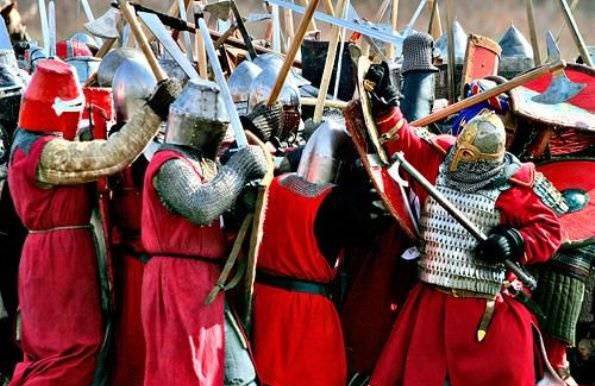
Another modern reconstruction. Novgorod fights with knights. Those for some reason in red. Who are they?
The situation is similar with the legendary “Ice Battle”, which we, here at VO, are finally studying not as much as at school, but scientifically, that is comprehensive, starting from the chronicles. But now it is time to talk about him with the words of one of the English historians, namely Phyllis Jestais, who is one of the authors of the book The Great Battles of the Crusaders 1097 - 1444, published by EKSMO in 2009.
I note, and not without pride, that the first truly voluminous article about this battle is The Great Battle on ice. Shpakovsky, V. UK. Military wargamer. 1993. oct./nov., as I was in England and published, and back in 1993 year. A drawing with the image of Russian soldiers participating in the battle was made to me by two girls, graduates of the Penza Art School. Savitsky, and the fact that the British took him, says that they liked him. Of course, they knew about it before that, but it was the first article by a Russian author after 1991, and everything was pretty traditional.
Then came David Nicolas’s book The Battle of Lake Pijpus, but it makes no sense to consider it. The fact that he is all that is known about this battle, just lumped together. And the facts, and speculation. And it turned out that there the Mongols were jumping, and the Germans were drowning, in a word, everything was like in Marshak's fable “The Elephant-Painter”.
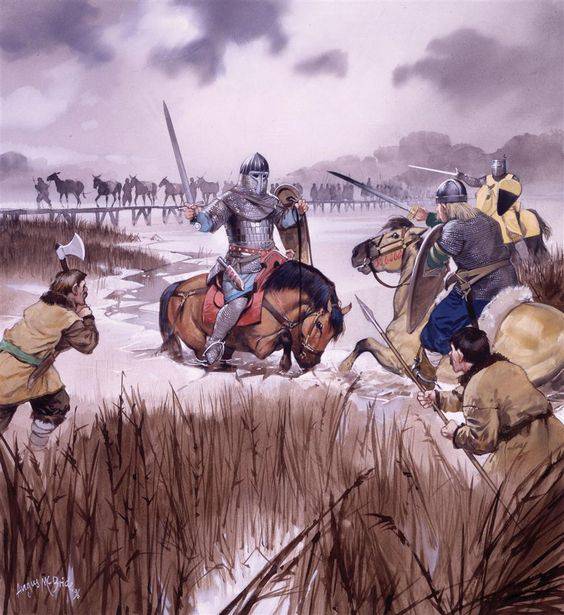
Illustration by A. McBride from D. Nicolas's book “The Battle of Lake Pijpus”. It seems to be so voivod Domash killed. Well, obviously the artist did not try here ... But he showed the notorious "grass" at the edge of the shore.
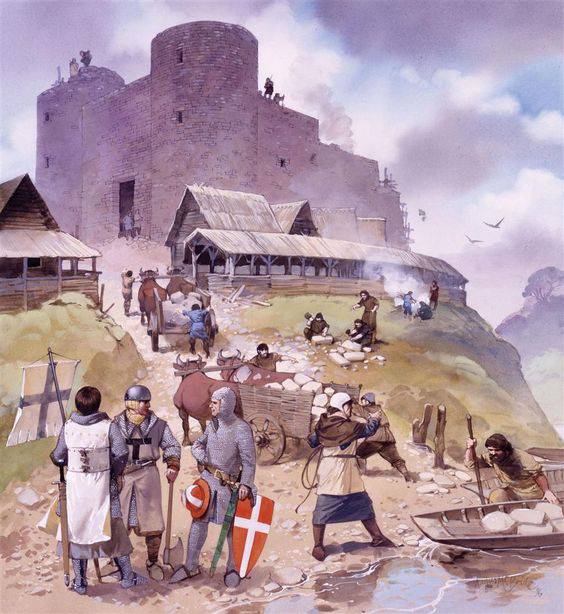
Knights of the Teutonic Order at his castle. But which order belongs to a warrior with a red shield, on which is a white cross? And what does a warrior do with bannerboards? Went out for a walk along the bank? It is completely ridiculous and strange ... A. McBride from D. Nicolas's book “The Battle of Lake Pijpus”.
But Phyllis wrote more interesting. That is why I want to give here the translation of his chapter, but, of course, with his comments, because they can not do without them. So, read, p. 158-167:
“THE BATTLE ON THE MIRACLE LAKE, WHOSE CHRISTIANS CHILDREN BATTLE CHRISTIANS, PRESENTS THE DUALITY OF SO-CALLED CROSS-WAYS IN THE BALTIC. Despite the small number of participants, the collision has resulted in an actual number of the number of the software of the number of executors on the list of software and software that are on the list of the main software developers on the software used by the keynote princes of the city of Nizhny Novgorod and the Nevsky region of the city of Nizhny Novgorod.
In the Baltics, the last non-Christian peoples of Europe lived. Crusades in the Eastern Baltic region in the XII century for the most part remained ineffective, especially because of the difficulty of retaining captured land. Thus, in the XIII century. a new policy was developed: the papacy set out to make every effort to form a “church state” in the Baltic States, which would be ruled by bishops and papal legates under the general leadership of Rome. However, on the path of the popes were two important forces. First: in the region there was a strong influence of Orthodox Christianity. Second: the dissimilarity of the incentives to action among the Western Crusaders and the lack of unity of their aspirations with the goals of the papacy. The Orthodox Christians of Russia did not want to accept the Roman spiritual primacy, and therefore seemed to the West to be schismatics who prevented the conversion of the inhabitants of the Baltic region to Catholicism. What is probably more important, the Russians seemed to be dangerous rivals in the development of local resources to the western merchants and seniors of military teams. These two factors manifested themselves with particular significance around 1240, the controversy reached a climax and ended with the defeat of the crusaders on Lake Peipsi in April 1242.
At the end of 1230's papal legate Guillemo di Modena began to preach a crusade and created a Western coalition against Novgorod. The latter was at that time the greatest of the Russian states — a center of commerce so large by Northern European standards that it was often called Mr. Novgorod the Great. If some kind of union could challenge the primacy of the West and restrain its expansion in the Baltic States, then this is certainly Novgorod.
At the end of 1230 and at the beginning of 1240, whatever it was, the Mongol invasion swept across Russia with a devastating shaft. Many Russian principalities have fallen, and Novgorod, although not subjected to defeat, was supposed to eventually recognize Mongolian suzerainty. Thus, it seemed that the time for the attack of the West on Novgorod was chosen correctly. The moment looked attractive - nothing seemed to have prevented the victory of these proud and influential citizens - Eastern Christians - and to force them into submission.
Guilelmo di Modena’s efforts to raise the western army on a crusade were crowned with considerable success, to a certain extent because the kings of Sweden and Denmark tried to somehow advance eastwards, and therefore the crusade was very suitable for them as a way of masking their own aspirations for pious deeds, and also as a means of attracting - in addition to achieving spiritual awards - financial assistance. In a word, they could easily call volunteers from all over Europe under the banner of an expedition not as sovereigns in their countries, but as supranational guardians for a common cause.
In the Soviet Union, Alexander Nevsky became a popular hero, and his victories were widely used by propaganda during World War II. This situation is explained by the fact that Alexander accomplished his exploits a long time ago, when tsars did not rule in Russia, but the main reason is that the prince successfully repelled the onslaught of the Germans from the West.
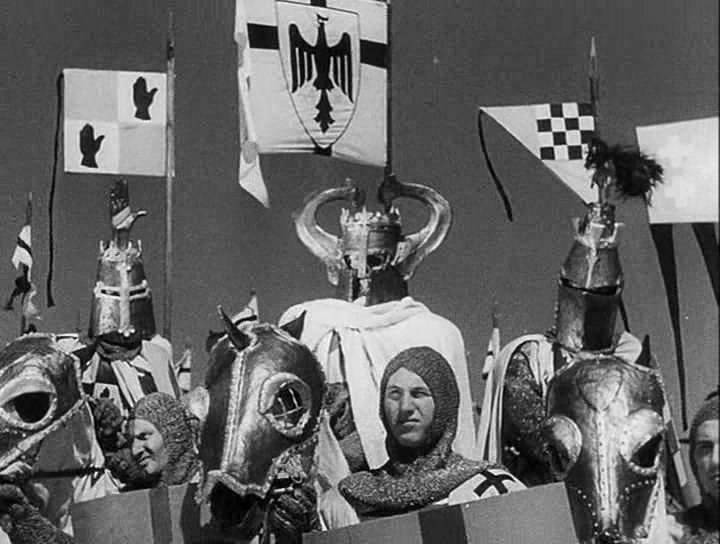
Not a single picture can be compared with Sergei Eisenstein’s film, which has become a film-classic for all times. And how everything in it is thought out. After all, for example, there was no duel between the prince and the master. Rather, no source reports about him, especially that the master of the order was captivated personally by Alexander. But after all, in the movie it looks?
By 1240, Mr. Gilyelmo returned to Italy, convinced that the work begun by him would end with the triumph of Western Christianity.
CAMPAIGN
However, the Western coalition created by Guilelmo was purely formal and did not constitute a cohesive force; the various formations of the Crusaders set in motion, but at the same time no one seemed to have seriously taken care of the development of a general strategic line. The Swedes, led by King Eric IX (1222 — 1250), invaded Finland in the spring of 1240. This alerted the citizens of Novgorod, and they called Prince Alexander, who had been expelled from the city shortly before. Alexander took over the leadership of the fight against the Swedes, using the help of the very well trained detachments of archers that served him (I wonder where he got it from? - V.Sh.).
15 July 1240. He defeated the Swedes on the banks of the Neva River, for which the grateful Novgorodians began to call Alexander Nevsky.
Despite Alexander's big victory over the Swedes, the threat from the West to Novgorod remained. The second Catholic army was already gathering to oppose it. It consisted of former members of the disbanded monastic military order of the sword brothers; Western knights who became feudal lords in Estonia; the Danes; the militia of the German Bishop Dorpat (Dorpat); and a handful of Teutonic knights.
Similarly, the Teutonic knights, members of the military-religious order, who had long since begun to cut their territories in the Baltic States, were eager for an excuse to attack their powerful neighbors, the frontier, Heinrich, Bishop Ezel-Wick, asking them to secure possession of the conquered regions.
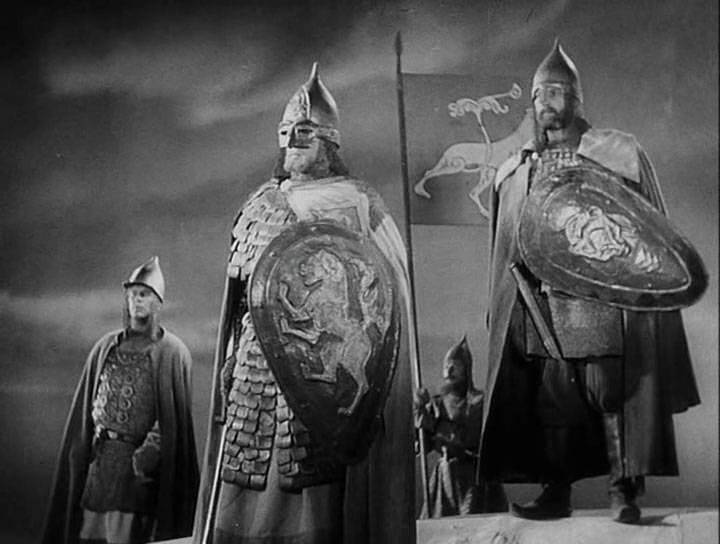
Russian warriors are dressed, one might say, just with love and very authentic.
Although Alexander Nevsky again left Novgorod, once again having quarreled with the merchant leadership of the city, at a difficult hour the citizens called him again.
Novgorodians agreed to the demands put forward by the prince to fight against the Germans and their supporters in Pskov, under his command. Alexander fully justified their trust.
Toward the end of 1241, they recaptured the territory east of the Neva and in March 1242 liberated Pskov. Then, Alexander and his army proceeded to the long-range raid on the territory of the German border Diocese of Dorpat, apparently wanting to beat the enemy with his own methods. It is clear that a serious expansion of the territory of Novgorod was not in his plans, all he wanted was a large-scale raid. Apparently, satisfied with what has already been achieved, Alexander with the 6-thousandth army (no number has been established in the chronicles! - V.Sh.) turned home after his advance guard was driven away from one bridge.
BATTLE ON THE ICE
It is likely that Bishop Dorpat Herman did not quite correctly understand Alexander’s maneuver, having accepted the orderly retreat of Novgorod for flight. We can not exclude the fact that Alexander seriously underestimated the number of troops at the disposal of Bishop Dorpat. Whatever happened in reality, the latter seemed to rejoice, believing that the dangerous enemy was in a very uncomfortable position. Most of the crusading army that was operating against Novgorod last fall, who went where, but some people still remained in Hermann’s diocese, and he saw that he could muster enough forces for the planned enterprise. Hermann began to prosecute the army of Alexander with the army, which included from 1000 to 2000 fighters (the number in different sources varies considerably), which, as it may seem, was a rather rash act because the enemy had 6000 (obviously, the author tries to reduce ends meet, using data from the Livonian Rhymed Chronicle - V.Sh.). Here, however, one should take into account the fact that Westerners possessed the best armor and weapons (there can be only one comment - ha-ha-ha! Our historian V. wrote about how it really was as early as 1975 year P. Gorelik in his articles in the magazine “Around the World” - V.Sh.)) than most Russians, and probably only intended to properly pat the retreating enemy, and did not expect to meet face to face in open battle.
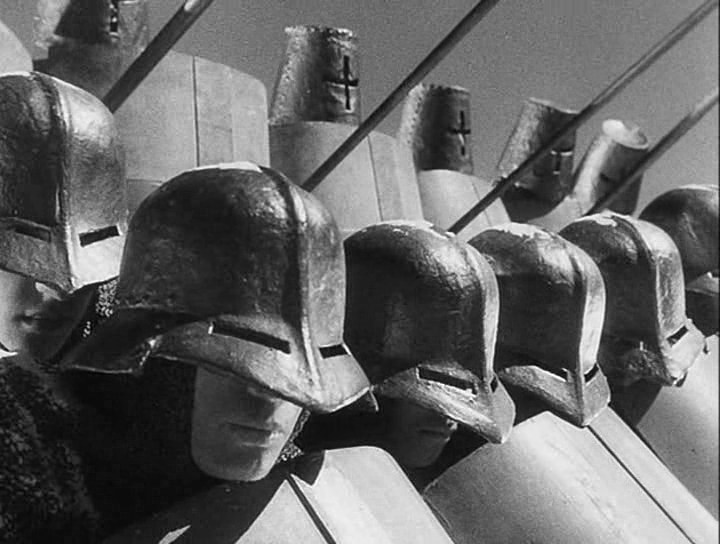
But where the director saw such helmets from the monster and the orderly servants, well, there is no such thing in any of the museums!
Alexander with the army moved on the ice of the frozen Lake Peipsi, followed closely by the crusading army also entered the ice, but somewhat north of the route the Russians had taken.
Anyway, they came ashore faster, and Alexander Nevsky got the time to organize forces before the arrival of the Westerners. He built troops on the eastern side in a place called Voronim Stone, where, with difficult terrain, attacking heavy cavalry with acceleration would have encountered great difficulties. The situation was aggravated by uneven layers of ice, which created additional obstacles on the shore as the water in Lake Peipsi froze and then melted (very interesting, where did he get all this from? - V.Sh.).
The prince was not mistaken in choosing a position for defense and repelling the attacking enemy, especially in light of the fact that the landscape features made it difficult to effectively use the strike link - the western heavy cavalry. Armed with spears, bows and axes, Alexander placed infantry in the center. It should be noted that, despite the portrayal of the battle on Lake Peipsi by Sergei Eisenstein in his famous film “Alexander Nevsky”, filmed in the USSR in 1938, Alexander’s troops were professional soldiers, and not peasant militia, desperately fighting for the salvation of Holy Mother Russia, as the director tried to show in an extremely propaganda film. Alexander had at his disposal some amount of light cavalry, which he placed on the flanks. In part, these horsemen were represented by horse archers, probably Polovtsy, or cumans (again, about cumans - from where? And from where - from an article in the magazine “Technique-Youth”, which was called “Prince's Name” and was published in issue number XXUMX for 2 year - V.Sh.).
Here it is: that article in TM that gave rise to many insinuations, which are not really based on anything.
The very fact that the Russians had built up and prepared to give battle to the persecutors, apparently, caused some frustration among the crusaders who turned out to be in a significant numerical minority. This is evidenced by at least the behavior of local Estonian warriors, who probably didn’t feel any disposition to fight and, as sources tell us, fled immediately, as soon as they saw the enemy force deployed far away (sources, that is, chronicles, report that ran a little later - V.Sh.).
Nevertheless, despite the superiority of the enemy over the Western army in numerical proportion in the best case for the Crusaders three to one, the latter still had chances for success. The core of their small army was the heavy cavalry - the knights and the "gendarmes". Dressed in robust chain mail, reinforced with wrought iron elements, and mounted on large warhorses, the knights, each in itself, outweighed any adversary as a combat unit. More importantly, the knights were well trained and were perfectly able to act in close formation, attacking with horse lava, which simple, but effective methods brought them more than once in the same XIII century. victory in battles, especially against deprived infantry.
The leaders of the crusaders (we do not have information under whose direct command they went into battle, perhaps under the authority of Bishop Herman himself) decided to strike the enemy positions suddenly. Clearly, they hoped to crush the enemy center and take the Russians to flight, so as to easily chop them up during the pursuit. Accordingly, the Crusaders built heavy cavalry without any tricks of the wedge, where Teutonic knights and their own “gendarmes”, the best of the best in the whole army, had advanced places.
All-destructive wedge rushed to the Russian infantry (well, why do we always have infantry in the center? In what chronicle is this written? - V.Sh.) in the center of the enemy system. She, however, resisted. It is very possible that the Crusaders did not manage to disperse properly because of the arrows of the Novgorod shooters (weapon they could be especially effective against the horses of the Crusaders) and because of the difficulty of rough terrain on which they had to act.
Before us is a scene from the film by S. Eisenstein “Alexander Nevsky” (1938), where we see the Russian army as a peasant militia that came out in defense of the Fatherland. In fact, Alexander's warriors were mostly professionals (if so, then where did the infantry with the drake come from? - V.Sh.).
FLANGED ATTACK
And yet the throw of the knights could still bring them victory, if the Russians had not put into operation the cavalry set on their flanks. Easier armed horsemen fell on the wings of the western army, horse archers on the left flank of the Russians inflicted particularly serious damage to the Danish knights on the right side of the Crusader formation. The Russians were so numerically superior to the Crusaders that they were able to completely surround the Westernizers (this is all true, but the chronicle says “they set up a regiment” and not regiments, and there is nothing about cavalry on the flanks. - V.Sh.).
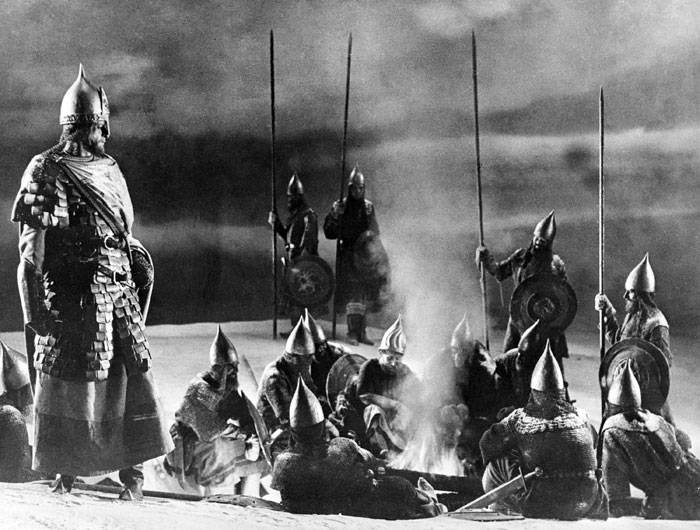
Judging by the film, the story helped the prince to win, that the blacksmith, the owner of the short chainmail, told the fire to his comrades: "Fox jumps and jumps, and between two birch trees - and get stuck! And the hare stands nearby and seriously says to her: - Do you want me all your girlfriend I’ll break the honor? ”“ Why are you, what are you, neighbor, how can I regret it! And the hare to her: “There’s no time to regret! And I’ve broken it! The prince heard it, understood everything, built the troops correctly and ... defeated the Germans on the lake!
Many of the Danish knights turned around and tried to gallop back to the other side of Lake Peipsi, pursued on the heels of the Russian cavalry. Apparently, it was here that only the battle and proceeded on the ice of the lake. Even if someone from the western warriors on powerful horses fell into the water, it is unlikely that any of them drowned, because the lake is extremely shallow (in some places the depth does not exceed 30 cm) (well, at least it says so, because that there was a battle, the Germans were drowning, and the Russians who fought with them were not. They just stood and watched! But it does not happen on the ice! - V.Sh.
Nevertheless, the maneuver on the frozen lake was enough to bring Alexander the victory in the battle on Lake Peipsi, which the Russians also call the “Ice Battle”.
About 400 crusaders died - up to half of all who entered into direct slaughter with the enemy. Six Teutonic and 44 other knights have captured. The losses could have been perhaps even more sensitive, but Alexander Nevsky forbade the pursuit of defeated Westerners on the far shore of the lake (that is, the author follows the Russian chronicles and the Livonian Rhymed Chronicle - V.Sh.).
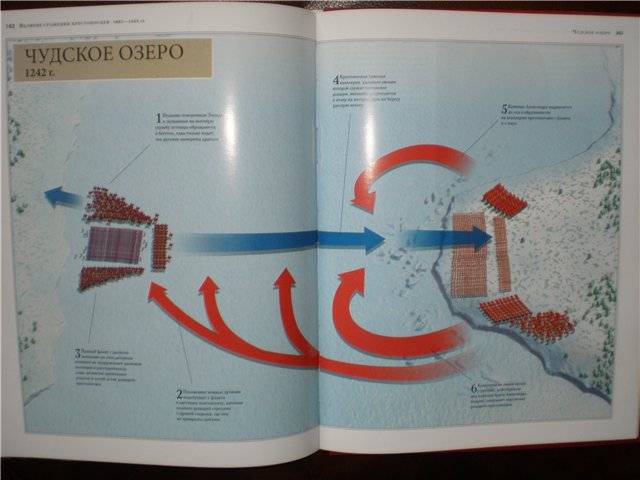
And this is the scheme of the battle given in the book. And then the author apparently wrote one thing, and the artist painted another. Look at the knightly wedge. Infantry - that is, chd, inside it! Knights so protected Chud? And why did she fall "countless"? Or is it their servants and crossbowmen? Funny, huh? And now the "pig" jumped forward, and the infantry ... The infantry remained "back"! And she simply could not catch up with the riders, and there was nothing she could do in the place of a mad horse fight. And the wedge itself - it could be at the beginning and there was a wedge, but, having gained speed, it had to break up into the “fence”. Otherwise, the rear horsemen would have crashed into the braking front ones, but they could not help but slow down, having met anyway - the infantry or cavalry. Look at the medieval miniatures - horsemen separately, infantry separately. Do you know why? Because the infantry rider can not catch up. The horse is fast on foot! And then there were several knight squads. No one could bring them into one squad, this is a direct damage to knightly honor. And they went into battle in parts and were eventually defeated. (This is the only speculation that we can afford, based on the sources that have come down to us. - V.Sh.)
EFFECTS
Lake Peipsi was not really a place of such an important battle, into what it turned its anti-Western ideology of Russians and later legends. Their resurrection was especially promoted by Sergei Eisenstein with his magnificent theatrical action on the film “Alexander Nevsky,” the blood for which the music was written for which was written by Sergei Prokofiev. Having won, Alexander made peace on rather favorable conditions for the West, which once again confirmed the fact that he did not seek to expand Novgorod’s possessions in the western direction. Bishop Dorpat and his allies readily accepted the terms. Novgorodians left the border areas captured by them, and Alexander released the captives, while the Westerners released the hostages they had.
Whatever it was, the battle had a negative impact on the prestige of the Western conquerors and could have prompted some of the conquered peoples of the Baltic to revolt against the Western masters. So, soon after the clashes on Lake Peipsi, the Prussians rose against the Teutonic Order, although the rebellion might have happened sooner or later and regardless of the results of the battle under consideration. It is clear that the order was not seriously weakened by losses in the confrontation on the ice. Too few, actually, the Teutonic knights fought there, as not only the great master, but also the commander of Livonia or one of his deputies did not participate in the battle. The following year, the Estonians rebelled against Denmark, but the company was doomed to failure from the very beginning.
Meanwhile, the sad outcome of the crusade against Novgorod revealed the weakness and illusory nature of the papacy’s grandiose plans in the region, since it clearly failed to direct the efforts and energy of nontrivial-minded northerners to the single channel, whose fighting and greed could otherwise have other consequences.
Probably the most important consequence of the battle was the rise in prestige of the Russian prince Alexander Nevsky. The legends about the battles on the Neva and Lake Peipsi louder and louder louder than his exploits, which made Alexander a great figure and even holy, as a defender of Russian Orthodoxy. From a political point of view, he also found himself in a clear win. The reputation helped him in consolidating power in Russia, which several centuries later led to the unification of the country under the scepter of the great princes and kings - his distant descendants.
COUNTERPOWER FORCES
WESTERN VOYSKO (approximately)
Teutons
Knights: 20
Order "gendarmes": around 200 Danish and Estonian knights:
about 200
Militia from Dorpat: about 600
Estonian tribal warriors: 1000
Total: 2000
NOVGORODSKAYA VOYSKO (approximately)
Mixed forces, probably half cavalry and half infantry
Total: about 6000
And now a little about the content. If we discard all the “fantasies” of the author, then we get a very thorough, balanced and objective material, in which there is not the slightest hint of derogation, or the rewriting of Russian history. And this text in English is read by the British, Americans, Australians and New Zealanders, and even the inhabitants of South Africa, of course, those who read, because they do not read there much (as we do now, too!). So you need to have a great "anti-Western" mentality and fantasy in order to see something anti-Russian in all this. Therefore, it is not necessary to lump politicians politicians, journalists who have failed to learn (I know many, I met them personally) and ... historians who value their reputation and, if possible, and the historian has available information, they try to write truthfully, without opportunistic tricks and fantasy. Well, and the manner of presentation of each people has its own and is connected with the peculiarities of the national culture. We have a more academic style of writing, they are more close to a conversational manner. And that's it!
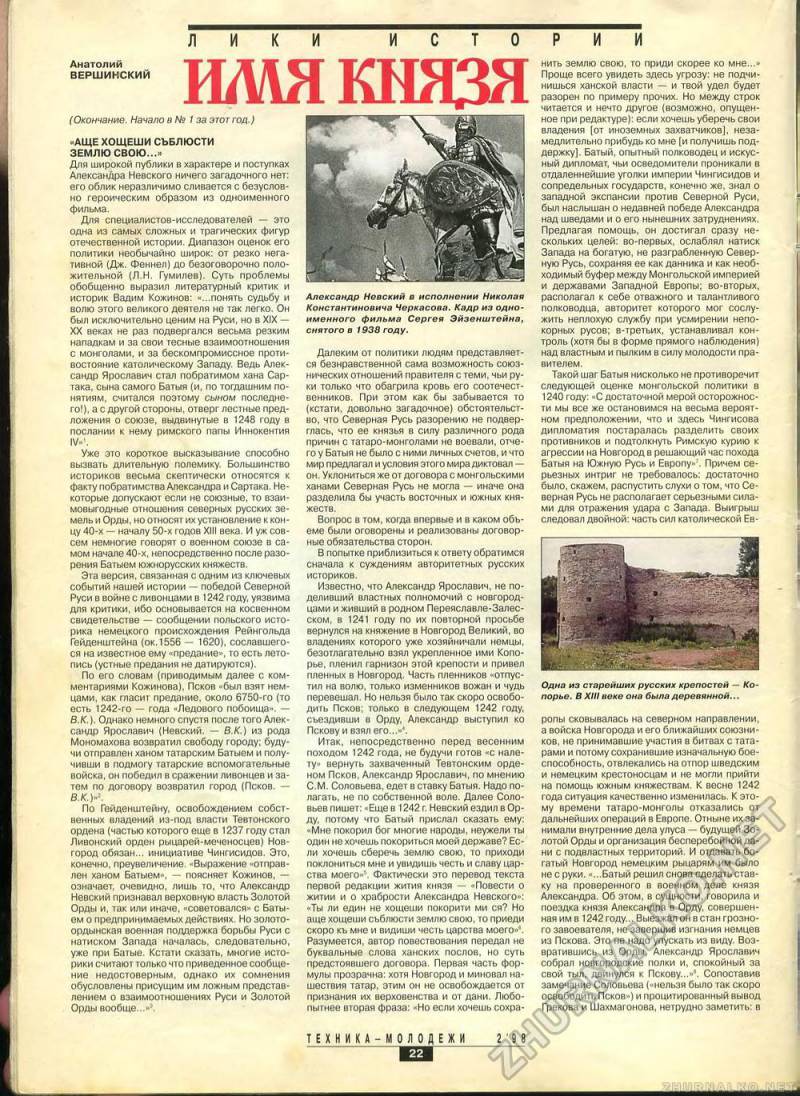
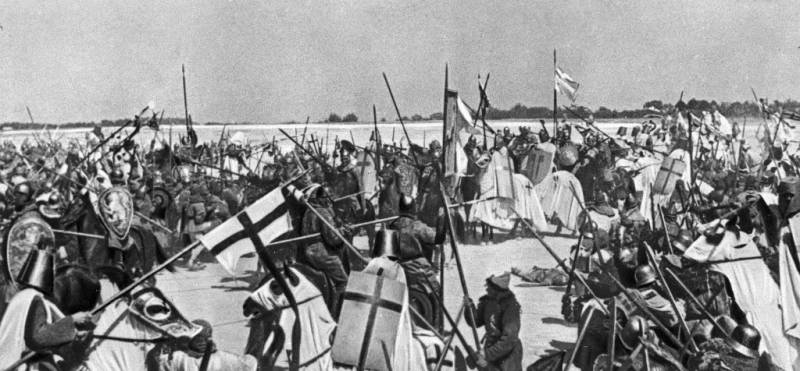
Information